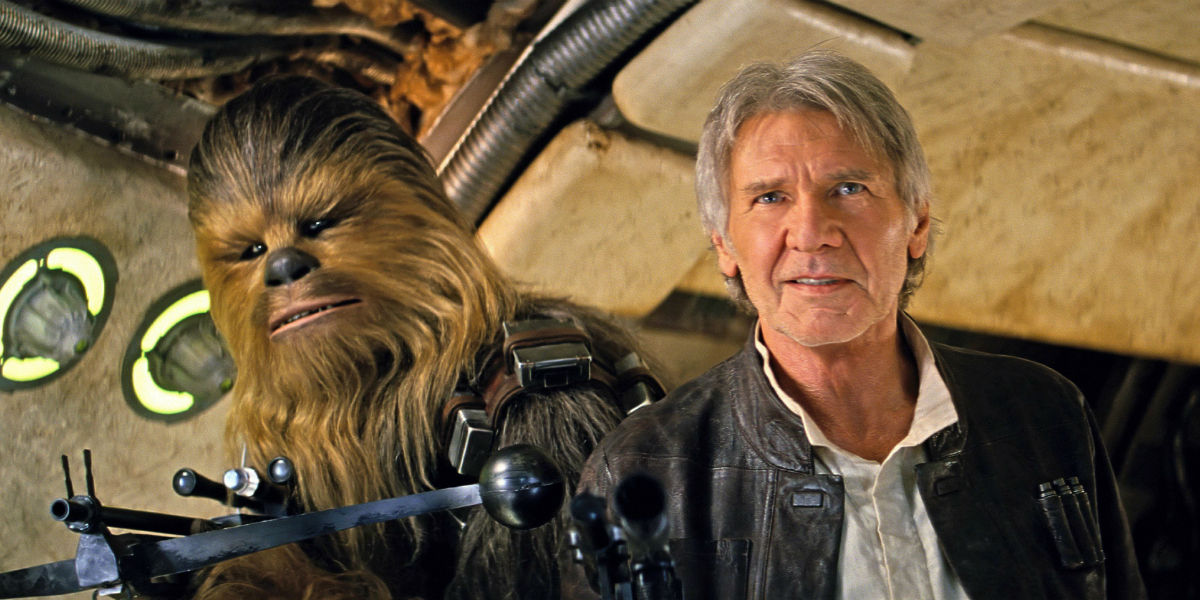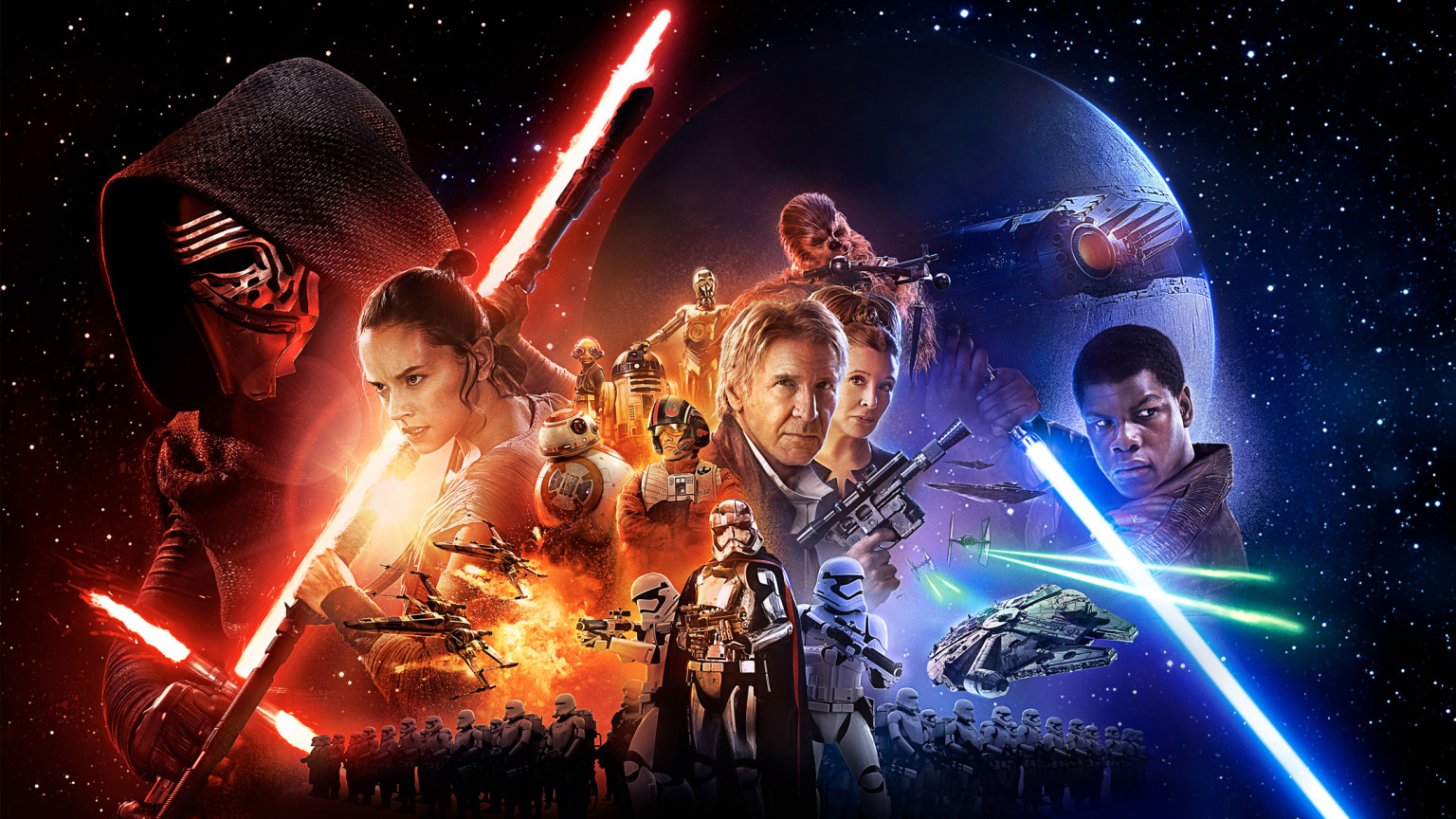Movie: Star Wars: The Force Awakens
Directed by: J.J. Abrams
Starring: Harrison Ford, Daisy Ridley, John Boyega
Verdict: While beset by enough pacing issues to be more than a little distracting, the long-awaited continuation to George Lucas’ seminal space opera delivers on almost all of its pregnant promise, providing great action, spectacular cinematography, and a bevy of charismatic faces both fresh and familiar in a more-than-worthy addition to the canon.
In depth: Long ago in a movie studio far, far, away, George Lucas brought forth through the darkness of Early Seventies science fiction a new hope: an unprecedented sci-fantasy epic trilogy that influenced an entire generation of fans and changed the course of film making forever. The original Star Wars trilogy wasn’t just a movie series - it was a life experience, and even after thirty plus years, it still lives on in the hearts of adoring fans all these decades later. While the ill-conceived prequels a few years back put a bit of tarnish on an otherwise spotless memory jar, devotion to the original trilogy hasn’t waned one bit, and would ignite a fervor among all Star Wars geeks when Disney announced that it will be continuing Lucas’ beloved saga with a “proper” sequel. Despite my initial slight reservations, I’m quite pleased to say that The Force Awaken lives up to nearly all of its hype, being both a pleasing tribute to the nostalgia block, and a fun, classic sci-fi adventure through and through - in no small part due to the brilliant cast, epic scope, and timeless but powerful message laying at the heart of this resurrected franchise.
It opens in classic Star Wars fashion - throwing the audience right in the middle of a new conflict between the insidious First Order, a totalitarian successor to the evil Empire who plan to dispose of the New Republic and spread their new twisted order throughout the Galaxy; and the aptly (if unimaginatively) named Resistance, protecting the new Republic.
 |
| Star Wars: making evil look awesome for 40 years |
Luke Skywalker - eternal hero and Jedi Grandmaster - is currently MIA, and with him gone, all hope rests on the shoulders of his sister Leia, now general of the Resistance. From almost the outset, we’re thrown into the action, with the nostalgically in medias res kicking back to the old series. At the risk of spoiling those of you not familiar with the beaten-into-the-ground Jungian hero's journey after - oh - a hundred years, the story revolves around the search for the legendary savior of the Galaxy by both sides of the moral divide, bringing a host of planets and a few wanderers into the crossfire. This is a critical establishing point; The Force Awakens rides on its power to compel the audience into the mythos - but this time, with new characters and a new direction. Spurring on this gear shift is the film’s relentless action, always a hallmark of any good hero's epic. However, it bears noting that this was not, as so often the case, merely a cheap ploy to distract the audience with big explosions; the film’s substance never faltered, and the plot’s furiously kinetic pacing did nothing to detract from it. Filmmakers, take note: this is how you tell a compelling story without easing up on the octane one bit. Rarely do I get “pumped” for frantic action, but this movie pulled it off just right.
The cinematography and effects went a long way towards making The Force Awakens so compelling without overwhelming the audience. David Mindel has an acute sense of scale, and made everything seem so much bigger - and the actors, by extension, much smaller - that we could help but stare up in awe at every downed Destroyer, every derelict and ruin, we come across.
 |
| Think it could use a jump? |
While part of this can obviously be attributed to the march of movie making technology over the past 40 years, most of the credit belongs to the creators and their decisions - one of which, ironically, was deciding to not go “high tech.” One frequent complaint of the prequel series concerned the conspicuous use of CG. The Force Awakens take a different path, showing scale models whenever possible, and the movie felt smoother and much more organic because of it. Shielded from the paralyzing sheen of a computer-generated superficiality, we're free to focus on the phenomenally plotted story, only contending with the effects when they have real plot relevance.
Such a strong story demands strong characters, of course, and the film definitely provides, letting its new roster additions crawl their way to the heart of it. I must admit that the trailers teased my expectations quite a bit, and while the difference between what was and what I thought would be left me somewhat disappointed, it by no means took anything away from my enjoyment. John Boyega and Daisy Ridley were the stars here, or course, with the former’s portrayal of ex-Stormtrooper Finn (aka, FN-2187) being particularly noteworthy. Though Boyega entered this role relatively untested and swaddled in a storm of racial controversy, all doubts faded before the layered performance he brought to the screen. Although the trailer lead me to believe that he’d be the centerpiece of a redemption arc from darkness to light, we instead get a funny, engaging young traitor, one endowed with a perfectly blended balance of cowardice and courage who carries a significant portion of the early film on his shoulders. Finn provides impeccable humor without becoming “that comic relief guy,” all due to Boyega’s perfect timing and the surprising depth he brings to the role. Counter to nearly every other character in the mythology, Finn isn’t initially a rebel or a resister, but someone who suffocated under the oppression of the First Order to such an extent that he’s ingrained the despair and hopelessness so common to the dregs and tools in a totalitarian system.
Of course, Finn shares the spotlight with an equally fascinating, and in some ways more important, character - Rey, played by the up-and-coming Daisy Ridley. Rey could have easily been a Luke clone - and honestly, that wouldn’t have been a bad thing. However, Abrams and co. wisely injected a touch of mystery to her background, giving her more leeway in how quickly she "develops," so to speak. Rey is plucky, driven, and subtly idealistic without being self-conscious, and the strength Ridley breathes into her transcends any element of age or gender, putting her on par with the best hero archetypes of old. While there are a few cringey elements of "stop helping me!" in her early interactions with Finn, the pair eventually develop a close mutual devotion that will hopefully remain at the platonic level for the duration of the series. Though Finn took the lion's share of my attention for most of the film, Rey's past, her possible intriguing connections, and her potential in the future will definitely be on everyone's minds in next installments.
I had more mixed reactions to Kylo Ren; though played by a charismatic Adam Driver and blessed with a surprising amount of depth and humaneness, his arc felt pretty rushed, especially compared to the gradual unfolding that happened to Darth Vader. I understand that a lot went on behind the scenes during the first trilogy that affected how events turned out, but that doesn’t excuse The Force Awakens and its several anomalies in an otherwise perfectly-paced movie. Finn and Po Dameron - the handsome ace Resistance pilot played by Oscar Isaac who effectively kicked off the plot - bond alarmingly fast, though their brief relationship feels sincere and heartfelt. There is a lot of talk concerning Rey’s shockingly rapid growth in just one film - fast enough to let her duel evenly with a trained, experienced Jedi like Kylo Ren. I’m more forgiving on this front, since the extenuating circumstances of the climactic fight and Rey’s mysterious past are enough to make it more-or-less plausible, but it seemed like the filmmakers rushed her grasp of the Force just a bit too much.
But the biggest hiccup conerns how the older characters are utilized - or, well, not, depending on how you see it. Though both Han and Leia were welcomed, as always, their inclusion didn’t leave as big an impact as it could have. This is particularly true for the old smuggler; his presence lacked context, and his relationship with the two new stars was pushed a little too hard, too quickly.
 |
| "You say 'fanservice' like it's a bad thing." |
These problems, through relatively minor compared to the overall experience, was enough to make me scratch my head and strain my willingness to believe on more than one occasion.
But these concerns are barely a ripple on the pond when the film’s looked at as a whole. More than a few pacing issues, The Force Awakens will be remembered for the strong characters, thrilling action, and tightly-woven plot - easily on par with anything Lucas could have made at the very peak of his ability, and arguably the best this series has produced since The Empire Strikes Back. Abrams definitely delivered the goods in this one, and when Rey, Finn and the rest set off to continue the second leg of their journey, I’ll be ready right along with them, anxious to see where and how this saga will end.
Grade: B+





